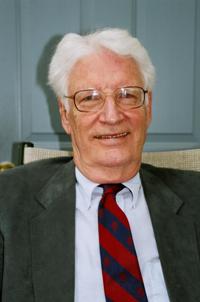In July 2023, we changed our name from AACC (short for the American Association for Clinical Chemistry) to the Association for Diagnostics & Laboratory Medicine (ADLM). The National Academy of Clinical Biochemistry (NACB) and AACC Academy were also both rebranded to the Academy of Diagnostics & Laboratory Medicine. The following page was written prior to this rebranding and contains mentions of the association’s old name, the Academy’s old name, NACB, and/or FACB (one of the old designations for members of the Academy). It may contain other out-of-date information as well.
 2011 AACC-NACB Award for Outstanding Contributions to Clinical Chemistry in a Selected Area of Research
2011 AACC-NACB Award for Outstanding Contributions to Clinical Chemistry in a Selected Area of Research
In his 50-year career at the University of Pennsylvania in Philadelphia, Dr. Nowell was a cancer researcher of world renown, an award-winning teacher, and an accomplished leader. He chaired the department of pathology from 1967 to 1973 and was the first director of the University of Pennsylvania Cancer Center—now known as the Abramson Cancer Center of the University of Pennsylvania. In 1960, just four years after the number of human chromosomes had been fixed at 46; Dr. Nowell made his first significant discovery as a tumor biologist. He and collaborator David Hungerford made the startling observation that the tumor cells from individuals suffering from chronic myelogenous leukemia contained an abnormally small chromosome, which they named the Philadelphia chromosome after the city where it was discovered. At a time when the idea that cancer has a genetic basis was widely disbelieved, this discovery provided the first clear evidence that a particular genetic defect in a single chromosome could lead to a population or clone of identical cells that accumulate to form a deadly malignancy. The tiny Philadelphia chromosome became a clear and consistent marker of chronic myelogenous leukemia, with broad implications for diagnosis and prognosis of the disease. It would be more than a decade before other cancers were found to be associated with other consistent chromosomal abnormalities. His other research led to many more insights into the processes involved in the normal and abnormal growth of cells. He has won numerous regional, national, and international awards, including the Albert Lasker Medical Research Award, the nation’s most prestigious honor for biomedical research.
